Somewhere between a joint and a genius idea, Hemp Press was born. What started as a clever way to make business cards double as rolling tips has grown into the only print shop on Earth fully dedicated to hemp paper, and it’s rooted right in Oregon. Founded by Matthew Glyer, Hemp Press isn’t just printing labels; they’re rethinking the entire lifecycle of Cannabis packaging, from how it’s made to where it ends up. In a world full of greenwashing, they’ve grown the real deal: clean materials, compostable inks and a zero-waste process that actually makes a dent. This story explores how one small shop is quietly reshaping the packaging game and why the impact matters to anyone who cares about the plant, the planet and the future of both.

Seeds of Innovation
Born in California and raised in Eugene, Glyer’s love of nature and commitment to service laid the groundwork for a business with a mission: to protect forests and create smarter, cleaner packaging. In 2012, he invented Crutch Cards, a custom-printed business card made from hemp paper and perforated into filter tips for joints.
“Initially, I sold them with cool printed designs, but everyone wanted their brand and art on them, so I made them a custom product,” he explains. What started with hand-feeding paper into inkjet printers one sheet at a time eventually grew into a 10,000-square-foot commercial print shop that ships worldwide.
“Hemp Press is one of a kind on Earth,” Glyer says. “We are the only print shop dedicated solely to alternative fiber (hemp) papers.” That singular focus grew from a deep connection to Cannabis culture and its community. “I built this business out of a love for Cannabis, so it’s baked into the ethos. The community has been so supportive of the vision of Hemp Press, so we keep giving back in every way we can.”
Before farms had logos, let alone packaging, Glyer was helping shape the visual identity of Oregon’s emerging Cannabis industry. “We laid a lot of the foundation by engineering the first joint box for the recreational market,” he says. “A lot of the classic Cannabis box forms you see across the country originated at Hemp Press.”
Counting the Impact
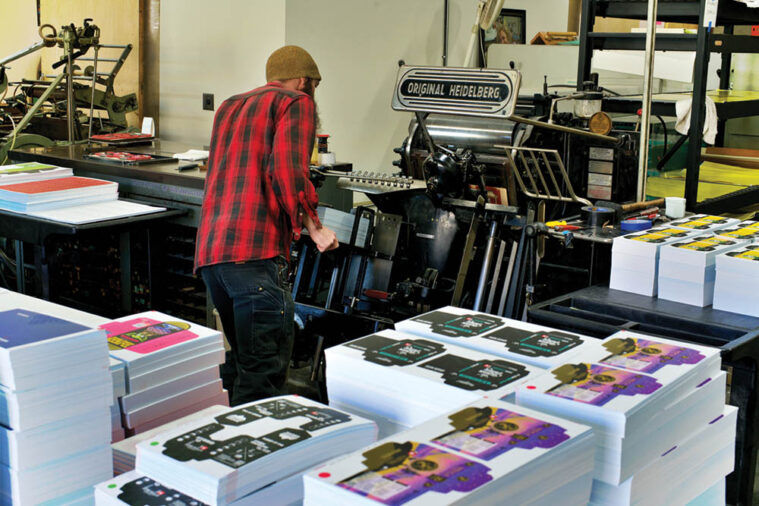
The real turning point came when he started calculating the environmental impact. “One day I started running numbers, and I began seeing how many acres of forest we had protected by using hemp for paper. Add to that our fiber needs facilitate planting roughly 20 million Cannabis seeds a year, and that feels like a fun flex,” he says.
Sustainability isn’t a footnote for Hemp Press, it’s the foundation. Glyer explains that a mid-sized Cannabis brand switching to their hemp paper could conserve several acres of forest annually. Plus, the paper requires significantly less energy to produce than tree-based stock. “Many cultivators and extractors alike can claim a product lifecycle that is carbon/energy negative,” he says.
But part of the challenge is education. “Most paper packaging is coated with plastic and treated with optical brighteners to achieve a shiny, bright-white finish, making it unrecyclable,” Glyer says. “In contrast, our hemp papers are both recyclable and compostable, and even our inks carry certified compostable ratings.”
DIY to ISO
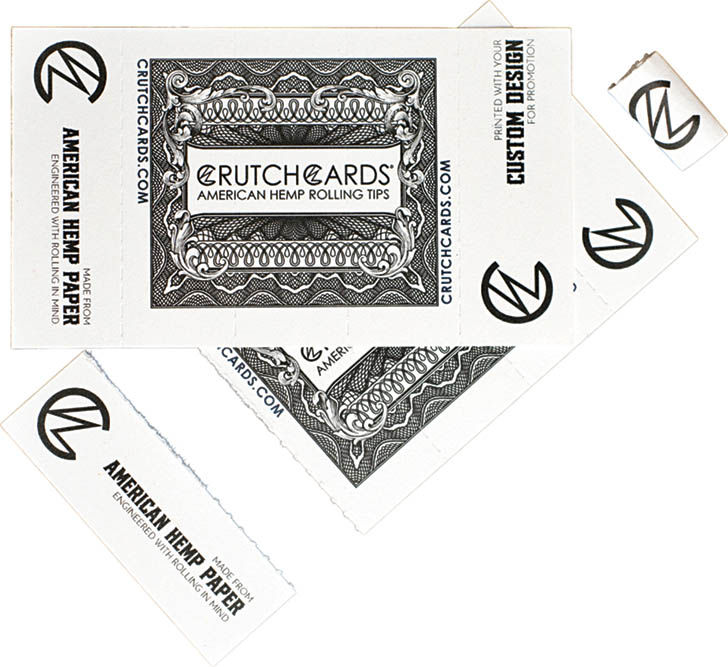
From the beginning, Glyer had to work around the skepticism of print shops unwilling to risk their equipment on hemp materials. “Part of why I started a print shop was that no one wanted to print hemp paper for fear of breaking their equipment,” he says. He bought and modified his own machinery to take that risk head-on.
“Now our papers are certified for use on the most high-end and advanced printing presses on the market,” he says. Even shops that approach it with caution are left “pleasantly surprised.”
Over the years, Hemp Press has experimented with every available ink, adhesive and finish. Today, they offer custom packaging solutions that can be printed and shipped in under a week, often including strain and lab data directly on the box, no stickers required. “Like award-winning Cannabis, our work is rooted in craftsmanship and attention to detail, with a zero-waste process where every usable inch of hemp paper is sold,” he says.
Cost, of course, remains a significant hurdle. “Logging subsidies and cheap overseas mills make wood-pulp paper hard to beat on price,” he says. “We’ve had to automate and innovate to keep total costs low for our finished goods.”
Big Help for Small Brands
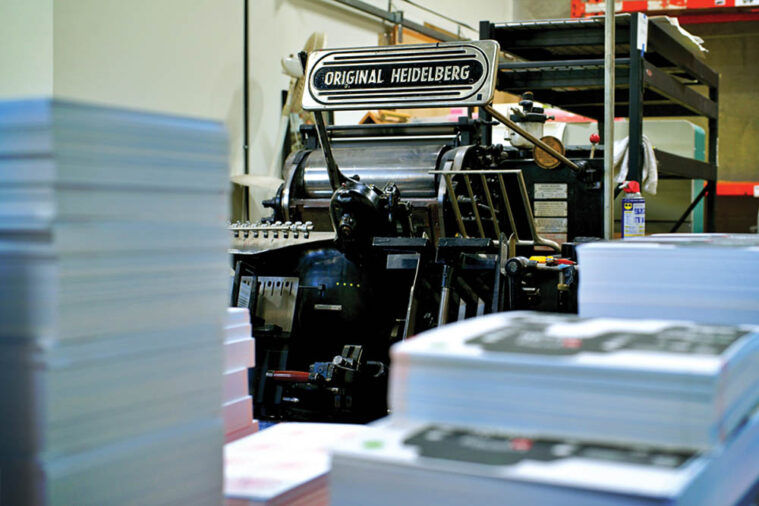
Still, the team is optimistic. “We’ve been part of thousands of product launches, from brand identity to packaging design and engineering to go-to-market strategies,” Glyer says. They’ve also won numerous packaging awards for form and function and helped brands replace massive volumes of single-use plastic.
Hemp Press also provides consulting and support for smaller, budget-conscious operations. “Choose a flexible, budget-minded packaging partner that understands craft Cannabis,” Glyer advises. “Small tweaks like right-sizing your packaging or streamlining label placement can drive costs down.”
Trash the Plastic
Looking ahead, Glyer is excited to roll out two major innovations: an automated assembly line to reduce labor costs and a machine-plus-compostable packaging system for prerolls that ditches the plastic pop-top. “Both are engineered to align with our rapid-turnaround printed packaging solutions, and in true Hemp Press fashion, sustainable materials come as the default,” he says.
He’s also not shy about what he hopes will change industry-wide. “Regulators should rethink today’s child-resistant packaging rules,” he says. “People rip open those bulky, multi-layer plastic containers and throw them away the moment they get home. They generate needless waste without improving safety.”
When asked how he defines success, Glyer simply states, “The future is now when new systems make existing systems appear obsolete. That’s why Hemp Press has proven Cannabis can replace extractive petroleum and forest-based packaging. Every choice brands make that aligns with consumer demand to protect nature is a step toward a richer, more meaningful connection with Earth.”
Paper with Purpose
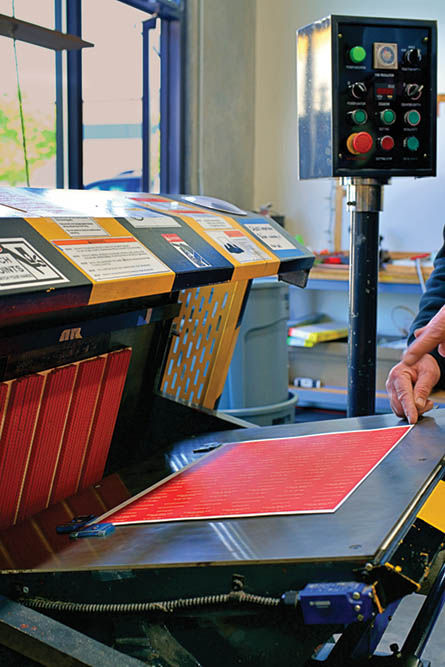
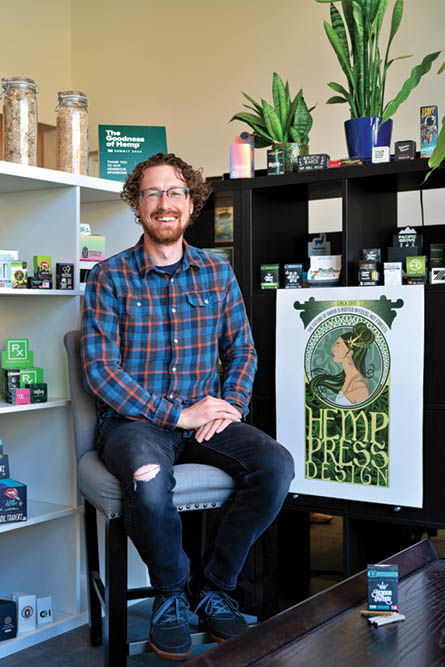
When it comes to sourcing, Glyer is clear about the company’s priorities: “The Hemp Press vision is one of American-made excellence. We continue to develop supply chain redundancies and resilience, with the ability to source fibers as well as process, pulp and mill papers both domestically and in Europe. All of our papers are certified carbon neutral in America, and we plan to keep it that way.”
Hemp Press collaborates with all kinds of national brands (Cannabis and otherwise). However, their roots run deep in the craft Cannabis space, where care, creativity and sustainability may still mean something. For those in the community who are tired of watching the industry pile on plastic while waiting for regulators to catch up, it’s clear: we can’t afford to wait. Hemp Press offers a way to move forward now, making thoughtful, waste-reducing choices that still meet compliance and look damn good doing it. If you’re ready to take packaging into your own hands, this is a solid place to start.
Quick Facts:
- Hemp Press is the only print shop in the world solely dedicated to hemp paper.
- Switching to hemp packaging can help a mid-sized Cannabis brand save several acres of forest per year.
- Hemp Press’ fiber needs facilitate planting ~20 million hemp seeds annually.
wearehemppress.com | crutchcards.com | @wearehemppress | @crutchcard









